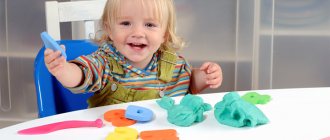Article “Emotional well-being of children in preschool educational institutions”
2. Respectful attitude towards each child, his feelings and needs.
Each child has the opportunity to bring their personal belongings to the group. For this purpose, a “home library” has been created in a specially designated space of the group, where children place photographs of loved ones and relatives brought from home, toys and things reminiscent of home. This brings the kindergarten environment closer to a family environment, solves the problem of adaptation and overcoming the often-occurring feeling of loneliness, and helps to establish a positive emotional microclimate in the group.
In a group, you can use a mood screen, where a child, coming to kindergarten in the morning, places his photo in accordance with his mood. During the day, he can make adjustments at his discretion. Thus, his internal state becomes more understandable, and the help of an adult, if necessary, becomes effective and timely.
3. Ensuring a high assessment of the personal success of each child.
The organization of the educational process is based on the principle of individualization. The teacher uses a flexible, person-oriented approach, taking into account the mental and personal characteristics of each child. This is expressed in a differentiated selection of tasks and exercises, in providing at the initial stage the freedom to choose partners in activities, at a subsequent stage - means and ways to achieve results, as well as in selecting an individual pace of their implementation.
The child’s success is reflected on the “Ladder of Success”. It is a kind of reflection of the child’s own activities, and also helps the teacher to identify the characteristics of each child’s self-esteem and his emotional state.
4. Lack of pressure and manipulation from adults.
The group must operate on the principle of equality in relations between adults and children. An adult acts as an equal partner, not an equal partner. A “flexible mode” is practiced, optimally combining organized and free time. There are no strict time regulations. The time allocated for independent children's activities is strictly observed (3-4 hours daily).
5. Providing opportunities for privacy and relaxation.
For emotional release, the group should have a corner of privacy, equipped with furniture and soft modules with books, illustrations, board games and toys selected for middle age. Rules of conduct for children in the corner of solitude are defined and recorded in pictures.
In the corner there should be toys and aids that promote relaxation: albums with family photographs; a telephone number on which a child “calls” mom or dad to share something secret; child's favorite things; "island of joy"
Consultation for parents “Emotional well-being of a child in the family”
municipal budgetary preschool educational institution kindergarten No. 24 of the village of Kavkazskaya municipal formation Kavkazsky district.
Consultation for parents.
“Emotional well-being of a child in the family”
Educator: Podlesnova EU.
Art. Caucasian
2021 – 2022 academic year.
Rules of emotional education or some tips for parents.
In the modern world, where parents are too busy with work and children spend too much time at the computer, emotional education and the development of the emotional sphere in children are of particular importance. Emotional sphere
- one of the most important components of human personality. Fear and delight, sadness and joy, melancholy and inspiration form the basis of our life. Negative emotions make a person suffer. Trying to get rid of them, parents instill in their children incorrect response patterns. But it is negative emotions that warn us of danger, force us to be attentive, and promote self-improvement. To succeed in life, to become an adequate person, you need to learn to correctly understand emotional signals and act consciously. Positive emotions, on the contrary, inspire you. Some adults strive too much for pleasure and make it the meaning of their lives. Such rules of upbringing turn offspring into demanding and capricious tyrants. Most people perceive fun as something rare, possible only “on holidays” and on a special occasion. They grow up children who, having matured, do not know how to rejoice just like that. People are not born optimists or pessimists. If parents tend to see, first of all, the good in any event, then their children will inherit an optimistic worldview. Parents who often punish their children and strictly monitor their mistakes provoke the formation of pessimism and uncertainty. Emotional education is teaching a child to a certain type of response. The ability to cope with emotions, control over difficult experiences and empathy are what all parents should teach their children. Without this, a happy and psychologically healthy life is impossible.
Talking about feelings
The first thing you should teach your child is to label emotions with words. Even the youngest children need this. When you tell your baby, “I know you're sad,” you're letting him know that he's understood and that he now knows what to call what he's feeling. According to research, labeling an emotion has a calming effect on the nervous system and helps children recover faster from unpleasant incidents. The moment we talk about an emotion, the left lobe of the brain, where the centers of language and logic are located, is activated, which helps us concentrate and calm down. Recommendation for parents:
Teach children to describe their feelings, help them choose the right words. To do this, you need to expand your child’s vocabulary. Remember: an expressed emotion is much easier to experience.




